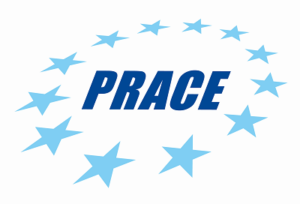A month after announcing that it was fast-tracking COVID-19 research proposals, the Partnership for Advanced Computing in Europe (PRACE) has detailed its first major round of awardees. The newly announced projects, part of PRACE’s “HPCvsVirus” initiative, will be receiving over 300 million core hours of computational power to advance understanding of COVID-19 and possible drug treatments or vaccines. “And,” PRACE wrote in its announcement, “this is only the beginning.”
 Within the first week of its fast-tracked proposal review process, PRACE had already announced its first approved project: COVID-HP, a project utilizing 20 million core hours on the Joliot-Curie Rome supercomputer (a 6.6-peak petaflops system hosted by GENCI) to research inhibitors targeting key proteins in the virus and certain nucleic acid sequences in its genome.
Within the first week of its fast-tracked proposal review process, PRACE had already announced its first approved project: COVID-HP, a project utilizing 20 million core hours on the Joliot-Curie Rome supercomputer (a 6.6-peak petaflops system hosted by GENCI) to research inhibitors targeting key proteins in the virus and certain nucleic acid sequences in its genome.
Now, just a couple of weeks later, at least fourteen other projects have joined its ranks, all receiving massive computing time allocations from PRACE.
Awardees studying proteins
The University of Jyväskylä
Researchers from the University of Jyväskylä in Finland will work to analyze COVID-19’s infamous spike protein, aiming to inhibit the protein using aptamers or by targeting its RNA-dependent RNA polymerase. The team was awarded 15 million core hours on the Joliot-Curie Rome supercomputer.
The École Polytechnique at Lausanne
A study from the École Polytechnique at Lausanne in Switzerland will use molecular dynamics to examine the small membrane protein (E) of the coronavirus, which is key to its viral assembly process. The project was awarded ten million core hours on the Piz Daint supercomputer (21.2 Linpack petaflops) at the Swiss National Supercomputing Centre (CSCS).
The University of Tuscia
A team from the University of Tuscia in Italy will investigate the interaction between the ACE2 receptor and the spike protein using molecular dynamics, comparing the results to predecessors from bats and pangolins. PRACE awarded these researchers with three million core hours on the Marconi100 supercomputer (a new, GPU-equipped partition of the Marconi system) at CINECA.
The University of Barcelona targets changes in the spike protein
Researchers from the University of Barcelona will seek small molecules to interfere with conformational changes in the spike protein and to better-characterize those changes in the structure and energy of the spike protein. The researchers were awarded 15.3 million core hours on the Hawk supercomputer (26 peak petaflops) at the Gauss Centre for Supercomputing (GCS).
The University of Southern Denmark
A professor from the University of Southern Denmark will lead another study of the spike protein, using molecular dynamics simulations to examine the “molecular hotspots” of the protein and aiming to identify strategies to limit the protein’s abilities. This study received an allocation of 35 million core hours on Piz Daint.
The Cyprus University of Technology
This six-month project will use molecular dynamics to study COVID-19 proteins, identify relevant protein motions, and mutate the proteins with the aim of producing epitope vaccines. This research has received an allocation of 16 million hours on Joliot-Curie Rome.
Awardees studying peptides
Nuritas
A team led by a researcher from Irish biotech firm Nuritas will work to identify peptides that can bond to as many targets as possible in the virus. This six-month project was awarded 40 million core hours on Piz Daint.
University College London
A professor from University College London will lead a project studying the design of peptide-based binders to block interactions between the spike protein and the ACE2 receptor, aiming to use machine learning to design those peptides. PRACE awarded the project 30 million core hours on Hawk.
The Spanish Research Council
A team from the Spanish Research Council (CIB-CSIC) will also study peptide inhibitors, giving priority to the generic drug library. This project was awarded 25 million core hours on Marconi100.
Awardees studying the main protease
The University of Florence
A professor from the University of Florence will lead a team virtually designing inhibitors against the virus’ replication process, targeting its main protease. The researchers were awarded 20 million core hours on Marconi100.
The University of Valencia
A team from the University of Valencia is also working to develop inhibitors for COVID-19’s main protease, building a foundation for those inhibitors by building a complex structural model that will allow for computational study of these enzymes. PRACE awarded 46 million core hours to this project, split evenly between MareNostrum 4 (6.5 Linpack petaflops) and MareNostrum 4 P9 (1.1 Linpack petaflops) at the Barcelona Supercomputing Center (BSC).
Other awardees
Nostrum Biodiscovery
Researchers from Spanish biotech firm Nostrum Biodiscovery will study hundreds of millions of molecules for their potential to inhibit COVID-19, using a hierarchical approach to quickly filter down to the most promising compounds. They were awarded four million core hours at the SuperMUC-NG supercomputer (19.5 Linpack petaflops) at GCS.
The Polytechnic University of Catalonia
This study, led by a professor from the Polytechnic University of Catalonia, will use supercomputing to help develop serological antibody tests. The project has received 40 million core hours on Joliot-Curie.
The Barcelona Supercomputing Center
Finally, the “CardioVascular-COVID” project, led by researchers from the Barcelona Supercomputing Center, will examine the effects of antimalarial drugs (like hydroxychloroquine) on cardiovascular systems, with the aim if improving treatment of cardiac patients suffering from COVID-19. The team has received 7.8 million core hours on Joliot-Curie Rome.
“These projects,” PRACE wrote, “will provide new lead compounds and targets for further in vitro and in vivo studies of [COVID-19], new insights for those drugs currently undergoing clinical studies and also possible new strategies for drug repositioning to treat SARS-CoV-2 infections.”
To read more about any of the projects, click here.





























































